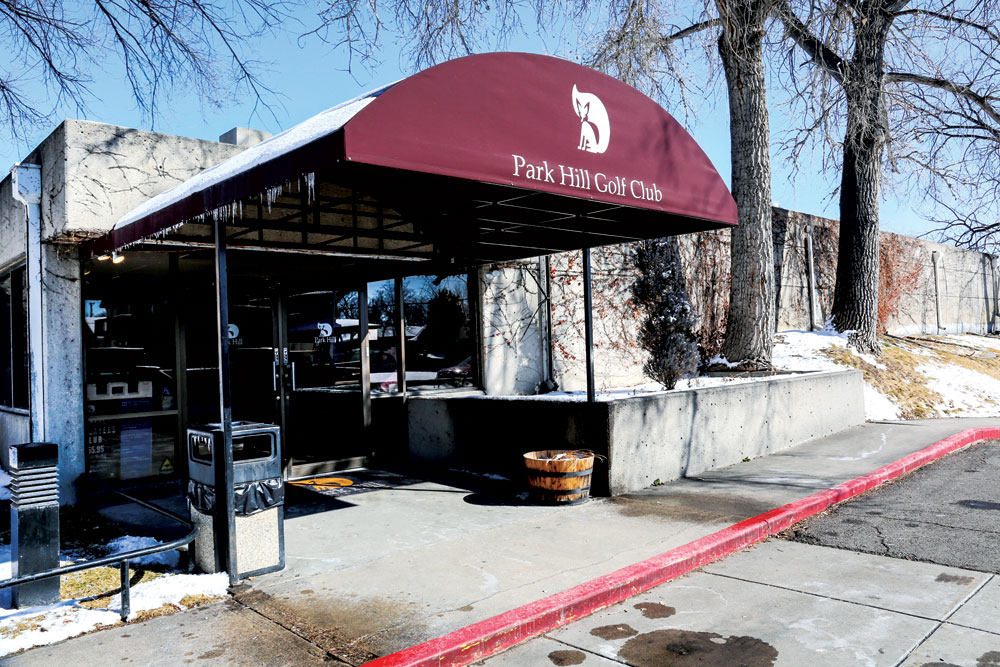
Park Hill Golf Course Club House
Will the 155-acre Park Hill Golf Course be an urban planner’s dream? Or will restrictions that allow only golf course use continue?
Who are the characters in this drama?
The landowner is the Clayton Trust.
Its mission is to use the land in its trust to fund early learning opportunities for children through age five, particularly those with limited opportunities. Its lease with the golf course operator for 155 acres along Colorado Blvd. near I-70 brings $700,000 a year that goes toward funding its programs.
The lessee is a subsidiary of a Texas private equity firm, Arcis Equity Partners, LLC.
Its lease with Clayton runs out in December 2018. Under the terms of the lease, Arcis has provided financial statements to Clayton that showed the golf course was not profitable after lease payments were made. And they have indicated to Clayton that, based on economics, they would not likely exercise their option for another five-year lease term But Arcis has not confirmed whether it will stay or leave—and it has until June 30 to do so.
The development rights to the land are held by the City of Denver.
In 1997, under the Webb administration, which sought to maximize Denver’s open space and parkland, the City paid the Clayton Trust $2 million in a contract that limits the 155 acres to use as a golf course until 2099. A subsequent contract in 2000 made the land exempt from real property taxes.
Taxpayer money was used to purchase control of development rights on the land.
Should citizens have a say in whether the land remains as a golf course until 2099? Or whether the contract between the City and Clayton gets changed to allow for other types of open space use and/or development?
What’s happening now?
In November of 2016 Clayton could see that golf course finances meant Arcis may not extend its lease, and started talking to community members about other uses for the land. That effort expanded in the fall of 2017 when they started a “visioning” process for future uses that has included an ongoing committee, community meetings, and a survey with about 750 responses.
Two-thirds of the respondents had not golfed, eaten or attended an event at the golf course for over two years. More than half of the respondents were very supportive of some or all of the land being repurposed, according to Charlotte Brantley, executive director of Clayton. Community suggestions have included mixed income housing, public park space, retail and restaurants, and a grocery store. The land is zoned as open space, but Brantley points out there is currently no free public use of the land.
Clayton’s financial goal is to get at least $24 million for the land to generate investment proceeds that will fund its programs.
In September 2017, the City and Clayton put together an agreement for the City to buy and lease the land (https://frontporchne.com/article/city-to-buy-park-hill-golf-course/). This agreement would have nullified the 1997 agreement with the City and opened up all or a portion of the land for sale and development. But with the golf course holding an option to extend the lease, that deal couldn’t be finalized.
Citizens are speaking out passionately on both sides—the opportunity for planned urban development and the value continuing the restrictions that limit the land to a golf course in order to keep green space. Front Porch letters to the editor in November articulated both positions (https://frontporchne.com/article/letters-editor-re-park-hill-golf-course/).
How did Clayton come to own the land?
The Clayton Early Learning website shares this story from the book, Clayton Early Learning 1911-1988: A History, by Beth Glandon and Thomas J. Noel:
In 1899 George Washington Clayton, Denver’s pioneer real estate tycoon, was found unresponsive on his office floor. His death two days later began the saga of Colorado’s most ambitious attempt to help underserved children.
To the surprise and disappointment of relatives, Clayton left the bulk of his $2 million estate to establish the George W. Clayton College. When opened in 1911, this state of the art, architecturally splendid campus occupied a sizable, 270-acre chunk of northeast Denver. Today, the handsome red sandstone buildings, now a designated Denver Landmark District, still grace 20 acres of land at the northwest corner of Colorado Blvd. and MLK Blvd.
Originally established for “white male orphans of reputable parentage,” Clayton College has evolved into an early learning institution serving all races and genders. Over one hundred years after George W. Clayton envisioned this institution, he would take great pride in how his dream has evolved into a modern, pacesetting haven for our neediest children.




0 Comments